
23 minute read
Looking back at the last year of school
from 2020-01 Sydney
by Indian Link
How the latest bunch of HSC graduates navigated Year 12
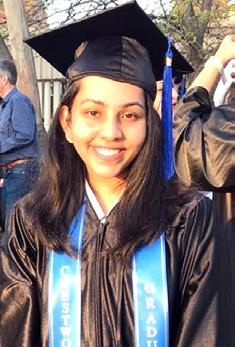
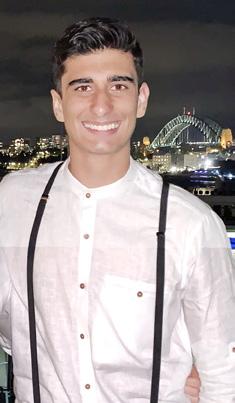
Samarth Shrivastava
North Sydney Boys High School
ATAR: 99.95
Subjects: English Advanced, English
Extension 1, Mathematics, Mathematics
Extension 1, Physics, Modern History, German Continuers, German Extension and Business Studies (completed as an accelerated course in 2017)
Awards/State Ranks: First in Course for German Continuers, German Extension and Mathematics
Amey Uppal
Castle Hill High School
ATAR: 96.35
Subjects: Extension Math, Extension English, Physics, Chemistry, Software Design and Development
Awards/State Ranks: Band 6 in Chemistry, Mathematics 2u, and Software
BY MANAN LUTHRA
With your HSC now done and dusted, you’ve probably had much opportunity to look back at it all with some wisdom. What did you learn about yourself in the HSC year?
Samarth: I learnt that I could accomplish any realistic goal if I embraced a routine, then actually followed through with it. While there were undoubtedly setbacks along the way, coupled with growing expectations, I knew that I would remain resilient if I never took anything for granted and simply trusted my processes. In a more pragmatic sense, I discovered my vocation to be a patent lawyer, as my interest in the legal regulations surrounding life-saving technologies drew me towards a combined Law and Biomedical Engineering degree.
Yashvi: Looking back, the key learnings are to have greater belief in yourself and not undermine or underestimate your talent and hard work.
Himaja: I realised that the best way to do well is to choose subjects that genuinely interest you. If you’re passionate about your work, it won’t feel like studying.
What were your expectations going into the HSC year? How did reality compare?
Samarth: I expected that I would be isolated from the rest of the world during my HSC year, studying alone in my room and only performing the necessary tasks of eating and sleeping. However, that was far from the case, as I forged some of my best memories and closest relationships in Year 12. In addition to the unwavering love and encouragement of my parents and sister, I was extremely fortunate in having
Yashvi Luthra
Girraween High School and Saturday School of Community Languages
ATAR: 95.80
Subjects: Advanced English, Business Studies, Hindi Continuers, Mathematics, Physics Awards/State ranks: First in State (NSW) Hindi Continuers, Distinguished Achiever (Band 6) Advanced English, Business Studies, Hindi Continuers an understanding support network of grandparents, aunts and uncles from Perth to India to the United States. I continued to play cricket and basketball with my friends at lunch, as well as starting to see my teachers as caring individuals through thoughtful discussions about goal-setting and wellbeing. Yashvi: At the beginning, the expectations were different to what I ultimately achieved; I thought the entire ecosystem helped me to excel.
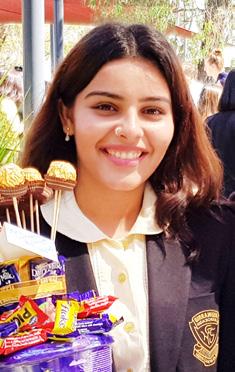
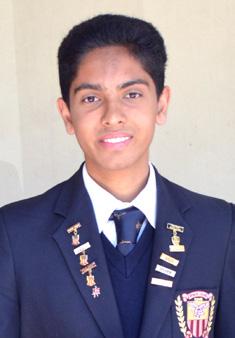
Himaja: I didn’t have many expectations, and just worked to the best of my capacity. I had really hardworking teachers, willing to edit and reread my essays and check my working out on the eleventh hour, so I was very lucky in that aspect.
What was your studying technique?
Amey: Practice papers played a huge role. I’d learn the content in class (and tutoring for some subjects), then I would solidify this by making my own notes along with homework.
Himaja Dave
Crestwood High School
ATAR: 99.55
Subjects: Maths Extension, Maths Advanced, English Extension 2, English Extension 1, English Advanced, Economics, Business Studies, Industrial Technology Multimedia (Accelerated)
Awards/State Ranks: Intech/ Shape nomination, All Rounders, Top Achievers (10th in State English Extension 1)
Then I would find past HSC questions that address those points, to practice applying my understanding. Before exams, I would be doing solely practice papers and refine my exam technique. If I found that I was weak in particular areas I would revisit my notes and come up with some questions for my teachers to clarify, but then it was back to past papers.
Samarth: When I was at school with teachers and friends or in my study group, I would consolidate my knowledge by asking questions and explaining concepts to others. At home, I would first write brief summary notes of what I learnt during the day, thereby compiling all my content regularly. That way, I was able to better allocate my time before exam blocks for completing past papers under timed conditions. Finally, I would complete my homework and work on assignments, making sure to take short breaks whenever needed. I particularly enjoyed reading cricket articles, eating a light snack or taking a short walk.
Yashvi: My Hindi teachers who were very helpful, practicing Hindi at home with my family and ensuring that I watch a couple of episodes of Tenali Rama everyday to improve my vocabulary in Hindi.
Himaja: Preparing for a big exam, I would always start by doing a practice exam to assess my current knowledge. This would help me analyse my weaknesses and highlight my strengths, and thus, I was able to divert time towards areas of improvement rather than repeating content I was already confident in. This is particularly important for maths - if you’re finding that the questions are too easy, you’re probably not focusing on the right topics.
I also found that keeping a study timetable was never effective for me. Instead, I chose to make a list of all my priorities in a given week. This was much more effective for me because I participated in numerous extra curriculars and had to travel interstate on short notice several times throughout my HSC. Hence, having a flexible study schedule was easier to manage.
How did you feel at the end of your final HSC exam?
Samarth: After the Physics exam on 11 November (a date that has been etched into my memory), our exam invigilator declared, “For the last time, pens down”. At that moment, as cliched as it sounds, it felt like an expanding balloon of stress had been burst. I was free to pursue all my interests without guilt, going to the movies with my friends later that day and planning for our family vacation to the United States and New Zealand.
Yashvi: I must admit the final exam was extremely challenging. I left the room thinking I could’ve tried harder but it was soon all washed away as the feeling of relief settled in.
Himaja: I was filled with an overwhelming sense of euphoria and nostalgia at the end of my economics exam. It didn’t feel real - as if I was floating in some bubble cloud waiting to burst with apprehension in the wake of my ending secondary education. In some senses, it was kind of anticlimactic, but I was definitely glad to head back home, and finally, get a good night’s sleep.
Social media now plays a big part in the lives of many HSC students. What did you like about Facebook groups such as the HSC Discussion Group?
Amey: I personally don’t use Facebook, though group chats with friends on other social media were very useful both as a way to keep up with work and ask questions, as well as peer motivation.
Samarth: I did not follow the HSC Discussion Group very closely, preferring to participate in my school’s NSB Class of 2019 Facebook group. We would share resources such as study notes, essay plans and past papers, as well as posting motivational messages to reduce stress around exam blocks. I particularly liked the camaraderie that the platform fostered, not only because we would benefit if everyone performed well, but also due to the nostalgic sense of Year 12 being our final journey together.
Yashvi: Absolutely! The HSC Discussion group consists of a plethora of quality exam notes offered by supportive members that made my study life smoother. Another perk of the group was the reassurance I received from laughing at the light-hearted memes as it proved that it wasn’t a solo journey, all of us were in this together.
Himaja: I think the discussion group was a fantastic online forum where students could access notes, information and an escape from the anxiety of the HSC. I remember waiting to leave the exam room to read the cohort’s reaction to my first English paper, feeling glad that I wasn’t the only one confused about Uncle Steve and his boomerang!
What extra-curricular activities or hobbies helped you maintain a balance between work and play?
Samarth: An integral component of my identity is my love for cricket, which I have played at a school, club and representative level over the past 10 years. I was privileged enough to captain my school’s 1st Grade team in Year 12, which involved leading the boys down to Melbourne in our annual sporting exchange, the Crawford Shield. While such activities required substantial time and effort, they instilled in me values of camaraderie, sportsmanship and dedication. Also, I have always enjoyed watching Bollywood movies, which I continued during my HSC year. However, rather than finishing entire films in one go, I would watch them in half-hour chunks. In the face of an increasing workload, maintaining your hobbies is not about narrowing your interests, but about managing your time more wisely.
Yashvi: Swimming, horse riding.
Himaja: 2019 was a big year in terms of extra curriculars. I won the NSW public speaking championship, and was the national runners up in the Plain English Public Speaking Competition. I was also on the Combined High Schools debating team, representing public comprehensive and selective schools against NSW’s elite private schools. In addition to this, I also volunteered in the Cancer Council’s Relay for Life, worked as a tutor, completed my Duke of Edinburgh Award and was a Captain at my school.
These were critical in keeping me grounded throughout Year 12 because I didn’t feel I was studying all the time. I also tried to remain active, playing basketball and catching up with friends at study groups because I found it was a way to make studying more engaging.
What would your advice to future final year students be?
Amey: I think consistency is key to reaching your ideal ATAR. This means working hard and steadily throughout the year and not just cramming before exams, to allow the content to sink in and become hard wired into your long term memory rather than short term. A helpful tool to ensure this is to log your hours of study each day, for each subject, ideally in a physical diary of sorts. Have a goal for how many hours of study you want to do each week, and divide it sensibly between each subject. This is really helpful as it illustrates your time allocation throughout the week, which is powerful in helping you re-evaluate your study schedule and habits.
Samarth: Learn for the sake of learning. When a teacher wants to extend you beyond the syllabus, do not switch off because that content will not be assessed; the skills you gain are always transferrable. Continue to read widely, as the scope of your knowledge is not finite; it will come in useful at some point in life. If you pursue excellence and not success, other problems of stressing about marks and balancing your leisure time will sort themselves out.
Yashvi: Gravitate towards people who make you laugh. Have fun. Time will fly this year so make sure you buckle down and set yourself a disciplined study timetable to balance your studies, fitness and social life. Start preparing for exams much sooner and please don’t leave it for the last few weeks. Last but not at least, take regular breaks to avoid burnout.
Himaja: Ask lots and lots of questions! I found that a lot of my friends struggled because they didn’t understand an elementary concept earlier in the year which carried through the rest of their HSC. This is perhaps the most dire mistake because it can be easily avoided by speaking up and asking your teacher, or a trusted peer for help. For me, this was particularly useful in subjects such as English Extension and Economics where students are encouraged to unfold complex ideas.
What moments from the past year do you remember most?
Samarth: While much of my time over the past year was spent studying, my most memorable moments came when relaxing with family and friends. On our Year 12 camp, we organised a Class of 2019 trivia night, complete with all the inside jokes and funny stories from the last six years. To see everyone’s faces light up at the mention of times gone by reflected how tight we had become as a cohort, poking fun at and simultaneously looking out for each other. I also vividly remember dining at the revolving restaurant in Sydney Tower for my sister’s 21st birthday, even though it was the day before my trial exams. While others were deep in last-minute revision, I was feeling on top of the world, content with my preparation and refreshed for the path ahead.
Himaja: I remember the first week of my trial exams vividly. I was in Brisbane the weekend before, furiously preparing for the English exam while trying to memorise my speech for the national final.
This year, there were a variety of new subjects and syllabi available to students; everyone studied a brand new English syllabus, for example. What do you think about the new English syllabus?
Samarth: I enjoyed studying the new English syllabus, as its unpredictability sought to reward original thought, as opposed to memorised work. In the English Advanced course, I found the Year 11 Reading to Write and Year 12 Craft of Writing modules highly rewarding, as they involved studying short texts and their construction. In exams, we only had the time to write thousand-word imaginative, persuasive or discursive pieces, so analysing the language features of similar texts was more helpful than responding to entire films or novels. While there were fewer changes to the English Extension 1 course, it was made more equitable by the introduction of the common Literary Worlds module, whereby half of the HSC exam was identical for every student in the state.
Yashvi: Although it was challenging at first, spending a couple of lunch times in a peer study session under the guidance of my awesome English teacher, I began to unpack the requirements of the syllabus. Syllabus- endorsed texts allowed me to dissect and explore human experiences, further pronounce my morals and acknowledge the representation of the phases of the changing urbanised society through poetry, plays and novels. The syllabus emphasised upon critical thinking skills which are mainly developed through reading a wide range of texts and experimenting with one’s own writing.
Himaja: I can’t really compare the new syllabus to the old one, but from what I understand, it’s more comprehensive and encourages students to voice their personal concerns rather than regurgitate essays. In light of our current socio-political landscape, I think that this change was critical and long overdue because it delves more deeply into the purpose of art and literature as a manifestation of humanity itself. We need to raise a generation of young people who can look beyond the pages and express their concerns about their world outside the bounds of alliterations and allegories, and I’m glad NESA took the first steps towards achieving that.
Following that, did you take any new subjects, and if so what did you enjoy about them?
Samarth: I studied a new Physics syllabus, which I felt provided a much deeper understanding of matter and energy. By shifting its focus from the history and philosophy of science to the derivation and application of mathematical formulae, the course better prepared students for STEM degrees at university. Additionally, I undertook a new Modern History course, which placed greater emphasis on critically analysing primary and secondary sources. I found this skill more useful than writing planned essays, especially with a view to life beyond university.
Himaja: I thoroughly enjoyed taking economics as an HSC subject and found it to be both engaging and rewarding, because it was unlike any other subject I had taken before. Often times, we hear about changes in the stock market, or wonder why we pay our taxes without understanding their significance. The preliminary and HSC economics course was fantastic in developing a basic understanding of the machine that is the economy and encouraged me to pursue a career in Actuarial Studies and start a cadetship at UBS in 2020.
Favourite quote from a teacher?
Samarth: After the HSC, some of my friends and I went to visit our primary-school teacher, so that we could thank him for his contribution to our development and generally catch up with everyone. When we told him about our educational and professional aspirations, he reminded us, “Just because you’re scaling a mountain, doesn’t mean you should stop looking to the sides.” That quote has stuck with me because opportunities truly can come from the most unexpected places, for which one must remain open-minded.
Yashvi: The mark of a person is how they make the people around them better.
Himaja: Just keep swimming.
Describe your HSC in three words.
Samarth: Stressful, exhilarating, emotional Himaja: Just keep swimming!
Yashvi: Chunautipoorna, santoshjanak, vishesh (challenging, enjoyable, special).
Japan tops list of most powerful passports, India ranks 84th
Japan, for the second time in a row, has topped a global index for the world's most powerful passport in 2019, while India ranked at the 84th position.
According to the Henley Passport Index, which periodically measures the access each country's travel document affords, Japan retained its top spot as the world's most travel-friendly passport due to the document's access to 191 countries with a prior visa.
Singapore is ranked at second position, allowing travel to 190 countries; South Korea and Germany shared 3rd position, with travel to 189 countries
Australia stands on 9th position, the same ranking as NZ, Canada, Czech Republic and Malta.
The US is at 8th position.
China is ranked 72.
India shares 84th position with Tajikistan and Mauritania, and is ranked lower than many African nations. The Indian passport, having slipped ten positions this year, offers access to 58 destinations.
Meanwhile, Afghanistan, Pakistan and Nepal ranked further low at 107, 104 and 101 respectively.
Henley & Partner's list is one of several indexes created by financial firms to rank global passports according to the access they provide to their citizens.
The Henley Passport Index is based on data provided by the International Air Transport Authority (IATA) and covers 199 passports and 227 travel destinations. It is updated in real time throughout the year as and when visa policy changes come into effect.
The Indian links in Golden Globe 2020 Best Picture (Drama), 1917
There is an Indian connection to Hollywood's Best Film at the 2020 Golden Globes. Academy Award-winner Sam Mendes' new war drama 1917, which won both Best Picture - Drama and also the Best Director award for Mendes, touts Reliance Entertainment and Amblin Partners among the banners associated with the film's production.
Reliance Entertainment is the media and entertainment arm of the Reliance Group with Anil Ambani as its chairman. Since 2005, Reliance Entertainment has been associated with film production in Bollywood and Hollywood in addition to its collaborations in the Tamil, Telugu, Kannada, Malayalam, Bengali and Punjabi film-making.
Amblin Partners lists Anil Ambani as one of its founders, along with Steven Spielberg, Jeff Skoll and Darren Throop. The company's investment partners include Reliance Entertainment along with Participant, Entertainment One, Alibaba Pictures and Universal Pictures.
Internationally, Reliance Entertainment has partnered with the iconic Steven Spielberg, since 2009, in the formation of DreamWorks Studios and thereafter, Amblin Partners. Commercially and critically successful films of the association include The Help, War Horse, Lincoln, The Hundred Foot Journey, The Girl On The Train, A Dog's Purpose, Bridge of Spies, The Post and last year's Green Book.
If 1917 represents the latest in that line of quality cinema in new Hollywood, a substantial amount of Reliance investment and infrastructural control has gone into the ambitious venture, said to be riding a budget of $90 million. The film's critical and commercial success underlines the fact that Reliance Entertainment, a 100 per cent Indian-owned corporate entity, is here to stay in Hollywood.
1917 premiered in December at the 2019 Royal Film Performance and had a limited release in the US and Canada on Christmas day. The film has garnered favourable reviews. The limited release was primarily necessary so that the film became eligible for all the major awards of this year.
The film is about two young Lance Corporals, Schofield (George MacKay) and Blake (Dean-Charles Chapman). Set during World War I, they are given an almost impossible mission. Racing against time, they must deliver a message deep inside enemy territory. The message is important to stop their own men - including Blake's brotherfrom walking into a death trap.
Although the lead cast comprises greenhorn actors, 1917 also features feted actors as Benedict Cumberbatch, Colin
Firth and Mark Strong in pivotal roles.
Mendes drew inspiration for the script of 1917 from his grandfather's stories. "It is difficult to make movies without big movie stars in the leads and expect people to come and see it in a cinema. I really hope this (the Golden Globes) win means people will turn up and see it on the big screen - for which it was intended," said the filmmaker who won the Oscar in 2000 as Best Director for American Beauty
Meanwhile, the film has received as many as 10 Oscar nominations including Best Picture, Best Director (Sam Mendes), Original Screenplay (Sam Mendes and Krysty Wilson-Cairns), Cinematography (Roger Deakins), Sound Editing (Oliver Tarney, Rachel Tate), Sound Mixing, Production Design (Dennis Gassner and Lee Sandales), Original Score (Thomas Newman), Makeup and Hair, and Visual Effects.
Indian-American astronaut in programme with eye on Moon, Mars
An Indian-American will be among astronauts who may get a chance to go to the moon or Mars following his graduation from NASA's programme training astronauts for those missions and the International Space Station.
Raja Chari was among the 11 astronauts who received silver pins this month marking their graduation at the Johnson Space Centre in Houston after two years of gruelling training. Following his mission to space, Chari will exchange the silver pin for gold in a NASA tradition.
He is the third astronaut of IndianAmerican heritage.
Explaining the Artemis programme in which he will participate, Chari said, "We're trying to get to the moon to stay by 2024. While we have the technology to do that, we're working on getting the resources to do that. It’s going to take a lot of work and it's not going to be easy."
The Artemis programme aims to put a man and a woman on the moon in 2024, establish sustainable moon missions by 2028 and ultimately send astronauts to Mars.
About his next step, Chari said, "We won't be assigned missions for a while but in the meantime we'll be helping all around Johnson Space Centre with different offices that are working on getting us to the moon."
A man walks on a bridge in Srinagar, India, 13 January 2020. The Kashmir valley is in the grip of an intense cold wave resulting in frozen water supply lines and both air and road transport affected.
He said that his guiding principle is asking and answering a singular question on a daily basis, "What did I do to help us get to the moon today?"
Chari shares that he inherited the value of education from his father Sreenivas V. Chari who immigrated to the US from Hyderabad. "One thing he brought with him from India is that school and education is a privilege, it's not a right. And that was something that was very, very much enforced in our house and we never took for granted the fact we got to go to school," said Raja.
Chari graduated from the US Air Force Academy with a Bachelor's degree in astronautical engineering and engineering science. He then went on to earn a master's degree in aeronautics and astronautics from the prestigious Massachusetts Institute of Technology.
Also a graduate of the Navy’s Test Pilot school, he is an accomplished test pilot and acolonel in the US Air Force. He has served as the commander of the 461st Flight Test Squadron and as the director of the F-35 Integrated Test Force.
Asked what it takes to become an astronaut, Chari said, "Technical competence, loving what you do and (liking) being around others." He shares that, for him, it was not a matter of checking boxes of qualifications but of being an expert in his field simply by being really passionate about it. He adds that it is very important to be a good team player, always adding something valuable to the missions which often involve being in a small space for a longer time.
One of the things that selectors looked for, he said, was whether he would be able to spend six months within a confined space. Being able to do this is of key importance when embarking on a space mission.
The two Indian-American astronauts before him are both women, Kalpana Chawla and Sunita Williams.
Space scientist Chawla, who was born in Karnal, Haryana, and immigrated to the US, was tragically killed on her second space mission when Space Shuttle Columbia broke up in 2003. She had participated in another mission on the same shuttle in 1987.
Williams, a navy officer, has served as the commander of an International Space Shuttle expedition in 2012. She had been on three other missions, in one of them as flight engineer.
Indian-American entrepreneur announces bid for California town Mayor
Aparna Madireddi, an Indian-American entrepreneur, has announced her bid for the mayoral seat of California's San Ramon town, replacing incumbent Bill Clarkson who will step down after four terms, a media report said.
Madireddi is the first person to launch her campaign for the seat. Earlier, the
Indian-American entrepreneur had made an unsuccessful bid for a seat on the San Ramon city council.
Madireddi has served in several volunteer positions in San Ramon, situated in Northern California's East Bay. She is currently the chair of the Open Space Advisory Committee, which prioritises land at risk for development in the rapidlygrowing town.
The Madireddis have lived in San Ramon for 22 years. A keen businesswoman, having founded Arvasoft, Inc., with her husband Venki in 1998, Ms Madiredi is also active within the local Democratic Party.
"I stepped up to run for mayor because our city is at a critical point. We live in a different era where things are changing rapidly," said Madireddi.
"Policies and ideas that may have worked in the past will not pass the litmus test today, when it comes to effective governance. I want San Ramon to be fiscally smart and sound for decades to come," she added.
Fourth Gen woman officer to lead men contingent at Army Day Parade
A fourth generation woman army officer will break a glass ceiling by being the first female to lead an all-men contingent at the Army Day Parade to be held on January 15, 2020.
Captain Tania Sher Gill from the Corp of Signals will be the parade adjutant.
Sher Gill, a B Tech graduate in electronics and communications, was commissioned in Mar 2017 from OTA Chennai. With a father who was in 101 Medium Regiment (Artillery), a grandfather who was in the 14th Armed Regiment (Scinde Horse) and a great-grandfather who was in the Sikh Regiment, inspiration is not is short supply for the young and dynamic lady officer.
Last Year, Captain Bhavna Kasturi from ASC became the first woman officer to lead an all-men contingent on Republic Day – a resounding “Savdhaan” for all those who still subscribe to stereotypes!
Indian-origin Lisa Nandy announces bid for Labour leadership in UK
Lisa Nandy, the Indian-origin British MP, has launched her bid for the Labour leadership race. She vows to "bring the party home" to its traditional heartlands after it suffered its worst defeat in over 70 years in the December 2019 election. It was Labour’s worst defeat as many northern heartlands turned blue (Conservative) for the first time.
The Wigan MP is the fourth contender to officially declare her bid in the race, alongside Birmingham MP Jess Phillips, Shadow First Secretary of State Emily Thornberry and Shadow Minister for Sustainable Economics Clive Lewis.
She announced her bid in her local constituency paper - a move symbolic of her promise to change the perception of Labour as London-centric.
Nandy wrote that a future Labour government should give "power and resources" to "every town, city, region and nation in the UK".
"We must leave behind the paternalism of the past and give people the ability to deliver change for themselves,” she said.
She is determined to defeat (Prime Minister) Boris Johnson in order to lead the compassionate, radical, dynamic government that she firmly believes people want and deserve.
Nandy's announcement came hours after Philips made public her bid to replace incumbent leader Jeremy Corbyn. The Birmingham MP called for a "different kind of leader".
Shadow Brexit Secretary Keir Starmer and Shadow Business Secretary Rebecca Long-Bailey were also believed to be considering a leadership bid.
A timetable for the leadership electionand any rule changes - is set to be decided by the party's ruling National Executive Committee (NEC) in January.
Tihar hangman set to emulate ancestors with Nirbhaya hangings
Most people are bequeathed a legacy of property or cultural values by their ancestors. But not always do you come across someone who has inherited a family tradition of being an executioner of criminals at the gallows.
Pawan 'Jallad' is one such man with this very unusual vocation - a man who earns his livelihood by ending the lives of society's rejects.
For the past four generations, Pawan's family has produced a long line of 'Jallads' or executioners.
It started with the first generation of the family in the 1950s with Laxman 'Jallad' - Pawan's great grandfather - who hanged convicts sentenced to death. Now Laxman's great grandson is preparing to conduct his first ever execution - of the convicts in the Nirbhaya gangrape and murder case.
Pawan had earlier assisted his grandfather Kalu Ram in executions where he learned the nuances of the family trade.
"This is the blessing of my ancestors. They only managed to carry out one or two hangings thought their lives. But I'm going to hang four convicts in one go," Pawan told IANS.
On being asked if he is looking to break the record of his ancestors (great- grandfather, grandfather and father), Pawan said, "You could say that, but in the past 100 years no one has had the chance to hang four convicts at the same time. I am the first to get this chance. But I cannot think of challenging my ancestors. They are my 'gurus' from whom I learnt this craft."
When Pawan's father died, it led to a conflict among Pawan and his brothers over who would inherit the historical legacy of the family tradition. Eventually his brothers withdrew from the profession leaving it all to Pawan who was granted a monthly salary of Rs 5,000 by the Uttar Pradesh jail administration.
Pawan is hopeful that he will finally get his chance in the same jail where his ancestors carried out the executions of Kashmiri terrorist Maqbool Bhat and murderers Billa and Ranga, among others.
For the first time in India, an executioner will carry out four executions together in the same prison. Reason enough for Pawan 'Jallad' to rejoice.
Freedom-era books, documents to go under hammer at Prinseps
A selection of books, newsletters and documents by luminaries of the Indian freedom struggle from the first half of the 20th century, will go on auction online shortly.
Held by auction house Prinseps, the sale will see important texts, such as Jawaharlal Nehru's autobiography Towards Freedom, his memoirs The Discovery of India and the complete volumes of Mahatma Gandhi's weekly newsletter Harijan Sevak.

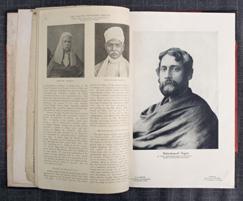
The auction will also carry the first edition of a multi-volume series titled Collected Works of Mahatma Gandhi.
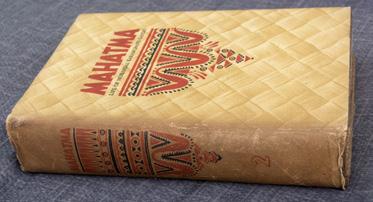
Also auctioned will be Gandhi's Satyagraha in South Africa, published in 1928; two volumes of Bankim Chandra Sen's magazine Desh, published in 1941 and 1948; and The Calcutta Municipal Gazette: 23rd Anniversary and Independence Commemoration Number, published in December 1947, from Rathindranath Tagore and Mira Chatterjee's collection.
Collectables up for auction include a calendar dedicated to Subhash Chandra Bose by Shiri Talashilkar created in 1945 and two Cawnpore Prints of Sardar Vallabhai Patel and Sarojini Naidu by Shyam Sundar Lal.
The no-reserve online auction of such valuable items is a celebration of the country's legacy of a brave political leadership and the journey to Indian Independence, documented with meticulous detail in these seminal literary works. It goes live from January 20-26.
Indian-American prof fired for joke about Iranian bomb list of US sites
An Indian-American professor, who posted a joke on Facebook about Iran choosing 52 US cultural sites to bomb, has been fired by his college.
Babson College said Asheen Phansey was fired because the post on his "personal Facebook page does not represent the values and culture of the College", according to WBZ television.
He had apologised for the post last week calling it "sloppy humour" that was "read as a threat".
His post was a reaction to US President Donald Trump's tweet about targeting sties "very high level and important to Iran and the Iranian culture".
Bombing cultural sites is a war crime under international law and contradicting Trump, US officials said that Washington would not target them.
Phansey suggested on Facebook that Iran selected 52 US sites such as the Mall of America in Minnesota or the residence of the Kardashians, a family of American celebrities made famous by the reality TV series "Keeping Up with the Kardashians".
He was the director of sustainability at Babson College, an institution that specialises in business and entrepreneurship education. It is located in Wellesley, about 20 km from Boston.
"I am really concerned about what this portends for our ability as Americans to engage in political discourse without presuming the worst about each other," Phansey said in a statement quoted by WBZ.
"People wilfully misinterpreted a joke I made to my friends on Facebook," and had hoped the college "would have defended and supported my right to free speech".
The college however, said that it "condemns any type of threatening words and/or actions condoning violence and/or hate".
IANS







